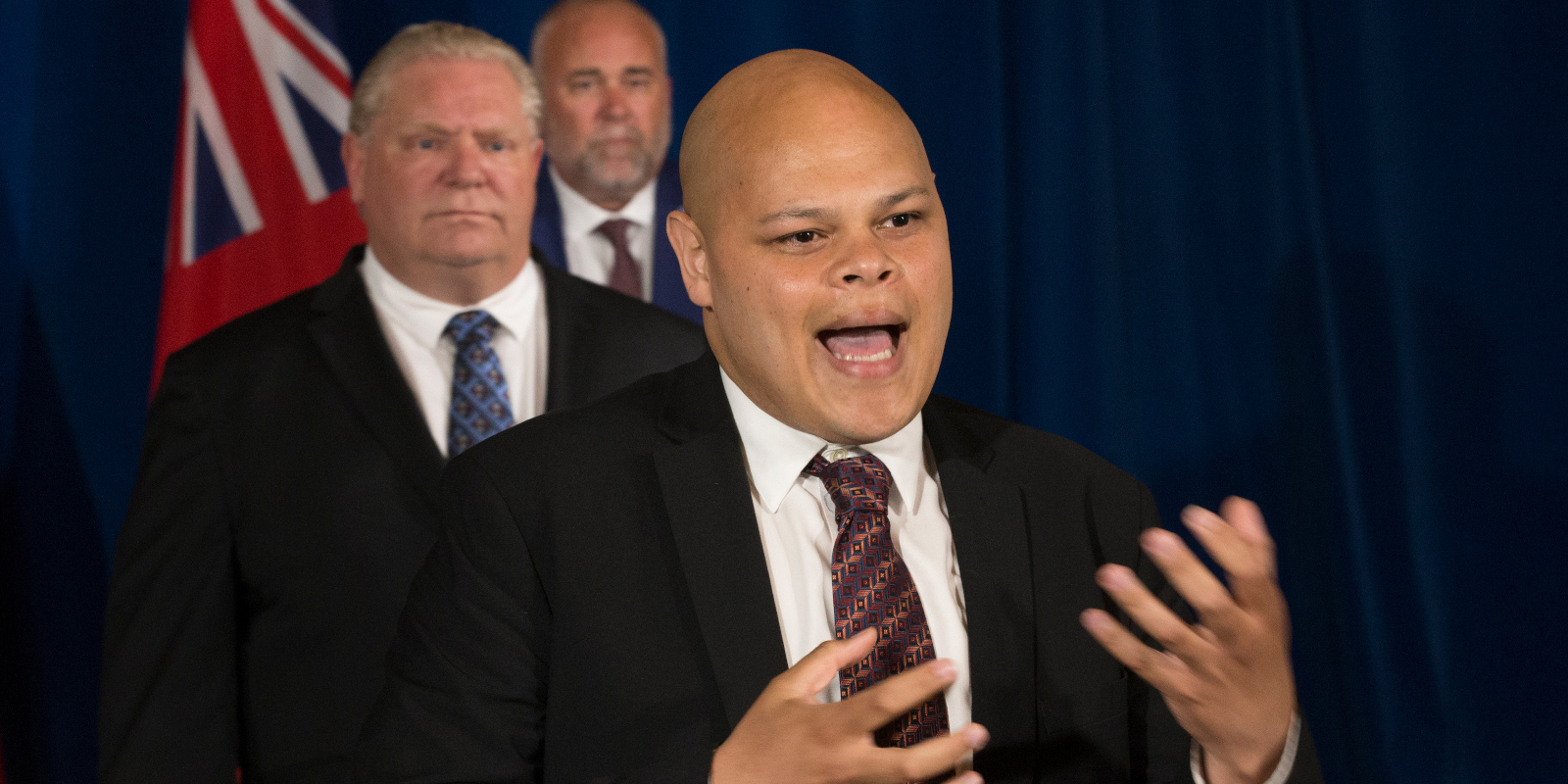Today, voters in Durham, Ontario selected Jamil Jivani to be their Conservative MP. The riding was previously held by former Conservative leader Erin O’Toole, who occupied the seat for 11 years. The Conservatives have held the riding since 2004.
Jivani has a more intriguing upbringing than most Canadian politicians. The outspoken Black conservative came from humble beginnings. He was raised by a single mom in the GTA. His teen years were spent in and out of detentions and suspensions for fighting. At 16, he was declared illiterate by the public school system. Yet, he’d go on to graduate from Yale Law School, becoming a friend of now U.S. Senator J.D. Vance, author of Hillbilly Elegy. He’s also a stage IV cancer survivor.
Early in 2022 The Hub’s Editor-at-Large Sean Speer spoke to Mr. Jivani before he entered the political fray. At the time, he was a senior fellow at the Macdonald-Laurier Institute and the author of the book Why Young Men: Rage, Race and the Crisis of Identity, which tells boys to trade in violence for purpose and healthy male role models.
That year, Jivani also resigned from a community safety and racism advocate position with the Ontario government after disagreeing with Premier Ford’s approach to pandemic school closures. Jivani also sued his previous employer, Bell’s IHeartRadio network, for ending his employment on Newstalk 1010, due to what he described as not fitting the stereotype of the “right kind of Black person.” He says he was hired due to tokenism and fired because of wokeism. The company denies the allegations.
Here are some of the key takeaways from our conversation with the 36-year-old Yale-educated lawyer, radio host, author and columnist, cancer survivor, and now Conservative MP for Durham.
1. His father being absent was one of “the most influential” aspects of his life.
“I mean, it’s odd to think that someone who’s not there has that much of an impact on you. But that is, I think, the case for a lot of children, especially boys, who grew up without father figures in the household. So, it’s always been something that I’ve paid a lot of attention to in my personal life.
I grew up in a neighbourhood where a lot of my peers also were in that same circumstance, where they didn’t have fathers. In an interesting and I think uniquely Canadian circumstance, we were in the suburbs of Toronto living in houses that were just built. So, it wasn’t like there was some kind of pre-existing multi-generational cultural dynamic. You had a bunch of boys without fathers growing up in an area where there weren’t really that many people older than us. And so, it was just something that was so clear to me, the need for that kind of intergenerational mentorship and support and guidance.
And as I got older and went through university, went to law school, I could see the differences where you do have people with strong, multiple generations of parents involved in their family and you can see what that produces in terms of stability, health, and resources.
… In other cultural contexts that leads to opioid abuse, like you might see in the Midwestern United States. Or in Europe, where I did some of the research for the book, that is the sort of cultural breeding ground for things like extremism, where terrorist organizations and extremists recruit young men.”
2. He says he chose Main Street over Bay Street because he wanted to actually change things, rather than be an elite who pretends to.
“[W]hen I was at Yale, I realized that there is a gap between what people who we sort of consider to be elites—whether that’s because of the money they earn, or the prestigious education they have—there’s a gap between what they talk about and how they live their lives. And I realized that a lot of these institutions were more concerned with saying the right things and what we might cynically refer to as “virtue signaling” than they were to actually, you know, change the grassroots conditions that most people of the working and middle classes grew up in.
…I think that really made me want to live in the middle between those two worlds. As opposed to, you know, just work at a corporate law firm or just teach at a law school.”
3. He is a conservative but believes government plays an important role in a person’s life.
“So as a conservative, for example, the stereotype is that a conservative like me would go around and tell working-class people and middle-class people, “Pull yourself up by your bootstraps, do it all on your own, the government owes you nothing except to get out of your way.” I don’t actually believe that. I mean, I’ve really never believed that…
…I think part of it is helping people understand that being a conservative, doesn’t, at least from my point of view, mean necessarily the sort of Ronald Reagan definition of conservatism; the neoliberal sort of definition of conservatism that I think a lot of people have been accustomed, whether it’s to culture or politics, to believe is the only way conservatives can address these sorts of issues. That may be a multi-generational effort to shift people from thinking that way, but I think that’s one of the responsibilities that we have to take on.”
4. He’s sick of the media portraying minority communities as ideological monoliths.
“Especially when you’re from a minority community like I am…we are often manipulated by these media narratives that suggest we are all this homogenous activist group with this singular set of demands and perspectives. It’s not true. We all know it’s not true. And I think it’s about time that those who are pushing those lies get called out for it.”
5. He thinks running for office will mean fighting back against the large number of people who don’t like him and wish he “kept his mouth shut.”
“[W]hen we talk about challenging the way power works in our country, where a very small number of people who are hostile to conservative values have a ton of power over our economy, over our political system, when we talk about challenging those folks, it’s not about being hard Right to balance them out with some extreme position on the other side. It’s just about fighting to exist as a normal dude. If I can do that, then I think that that, to me, is the plan here, so that normal people get to exist in abnormal situations and we’re not changed but rather those situations get changed. That would be the ideal way that I think we would exist.
…Even running for office one day is going to be more of a challenge if I decide to do that because there is now a whole bunch of people who don’t like me, whereas if I just kept my mouth shut, that wouldn’t exist. So, there’s absolutely a social cost.
But I just remind myself every time I go to church, every time I go out in the community, every time I talk to people, I don’t have a social cost with those folks. In fact, I actually think that I represent them and reflect them a lot better than the people who claim—the leftists, for example—who claim to be fighting for them, but then seem to hate everything about what these people believe every chance they get.”
This podcast episode was published on February 15, 2022. Listen to Jamil Jivani’s full interview with Sean Speer on the audio player below or on your favourite podcast app.
If you enjoy Hub Dialogues, be sure to check out more insightful commentary on The Hub’s YouTube page:
Recommended for You

‘There are consequences to this legislation’: Michael Geist on why the Canada-U.S. digital services tax dustup was a long time coming

Rudyard Griffiths and Sean Speer: The future of news in Canada: A call for rethinking public subsidies

‘You have to meet bullying with counter-bullying’: David Frum on how Canada can push back against Trump’s trade negotiation tactics

‘Our role is to ask uncomfortable questions’: The Full Press on why transgender issues are the third rail of Canadian journalism



